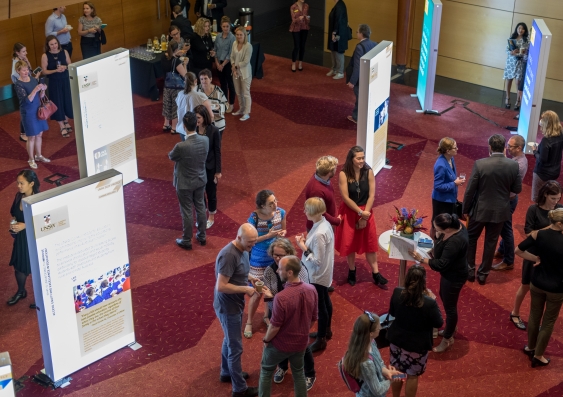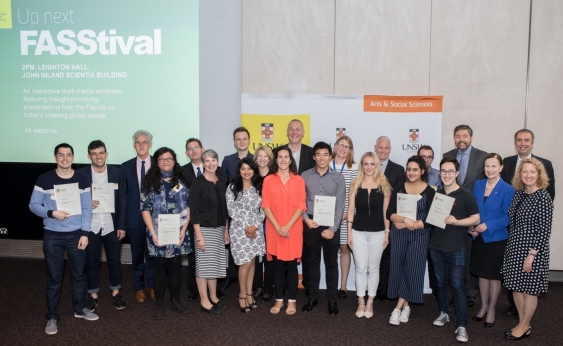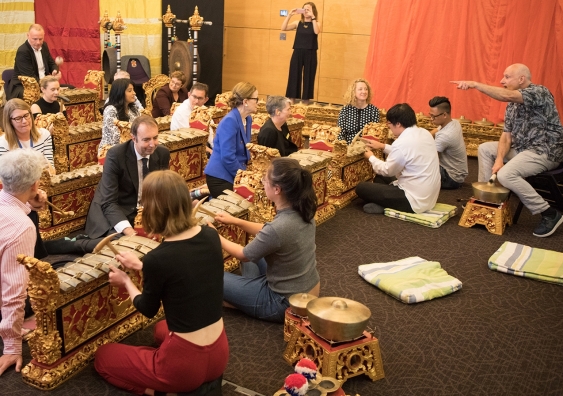On Monday 20 November, the Faculty of Arts & Social Sciences hosted their inaugural showcase. The day kicked off with UNSW VIPs being invited to a mystery workshop, which saw them detouring slightly out of their comfort zone as they came to grips with the skills required to play a Gamelan ensemble. Conducted by Associate Professor Manolete Mora, Gamelan is the traditional ensemble music of Java and Bali in Indonesia, made up predominantly of percussive instruments. The Gamelan workshop was lively and loud, a great introduction as the guests moved into the public opening of the FASStival showcase.
“This showcase is an opportunity for us to highlight excellence within the faculty, demonstrate some of the breadth and depth of what we are doing, and provide a snapshot of our work for UNSW management and staff,” said Professor Susan Dodds, Dean of Arts & Social Sciences.
“This is a community of scholars and students striving to develop a better understanding of the human condition through exploring and responding to significant local and global issues.”
Attendees heard from leading academics on their ground breaking research, including Dr Babere Chacha on his Global South Scholar Fellowship and the challenge of developing human rights education in Kenya; Associate Professor Bingqin Li on ‘Chinese social policy and urbanisation’; Dr Valentina Baū on ‘Communication for Development in Peacebuilding’ with a focus on post-civil conflict realities; and Professor Chihiro Thomson on the ‘Japanese Capstone Course’; the final segment was a short video from the October 30 Faculty Showcase “Says Who?” panel event, “Education & equality: Unfinished Business”.
Dr Paul Munro, co-founder of Energy for Opportunity (EFO) – a non-government organisation dedicated to the dissemination of renewable energy in West Africa – delivered an address on ‘Changing Geographies of Energy Poverty in Africa’.
“According to the Sierra Leone Government, less than 1% of households in northern Sierra Leone have direct access to electricity,” said Dr Munro. “But we also know from surveys that around 70% of Sierra Leone households own a mobile phone. So, this begs the question, how are people getting their phones recharged?”
The answer is mobile phone recharging kiosks, a couple of young local entrepreneurs will put their money together and buy a small diesel generator and run it day and night charging a small fee for people to charge their mobile phones, making a small income.
“So, while energy is a problematic function, people are engaging with electricity in different ways and I think we can build upon this and develop creative solutions to the energy poverty issues.”

Faculty of Arts & Social Sciences 'FASStival'. Photo: supplied
Large multimedia lightboxes displayed a series of topics which respond to the significant challenges identified by the UNSW 2025 strategy and the impacts of the faculty’s research in many areas, including:
-
Improving access, equity and excellence in education
-
Guiding HIV and sexual health programs
-
Innovating for disability
-
Addressing gendered violence
-
Ensuring a just climate transition
-
Supporting diverse and marginalised voices in public debate
Another research area, led by Professor Peter Saunders and Megan Bedford of the Social Policy Research Centre, looked at how much income a family needs to achieve an adequate standard of living. The New Budget Standards project is designed to guide current adequacy assessments and allow others to draw on the results in a variety of contexts where standard of living assessments is central.
Released in August 2017, the New Budget Standards report builds on previous Australian and recent international research to develop a set of budget standards for low-paid and unemployed Australians and their families.
Currently, for those unemployed and reliant on Newstart Allowance, the safety-net provisions fall short of the budget standards estimates per week by $96 for a single person; $58 for a couple with one child; and $126 for a couple with two children.
Making a global impact, the Disability Innovation Institute at UNSW is a world-first initiative conducting interdisciplinary research and education in partnership with people with a disability. Led by Rosemary Kayess (UNSW Law), Professor Karen Fisher (Social Policy Research Centre), Professor Julian Trollor (UNSW Medicine) and Associate Professor Leanne Dowse (School of Social Sciences), the Institute will position UNSW as a global leader in scholarship of accessible and inclusive working, living and learning environments, from developing tools for evaluating disability policies through to generating innovative technologies.

Annual Dean's Student Leadership Awards, Faculty of Arts & Social Sciences. Photo: supplied
The Annual Dean’s Student Leadership Awards was included in the showcase program, with winners being recognised in the categories of Academic Excellence Leadership; Social Engagement Leadership; Global Impact Leadership; and People & Culture Leadership.
“It is fantastic to have the opportunity to celebrate the excellent achievements of our nominated students, and meet the winners who are doing amazing things across the various pillars of the UNSW Strategy,” said Prof. Dodds.
“Even though we have just scratched the surface of the capacity across the faculty, I hope today’s showcase has given you a strong sense of the kind of research that is undertaken.”
The showcase wrapped up over networking drinks and live jazz.




